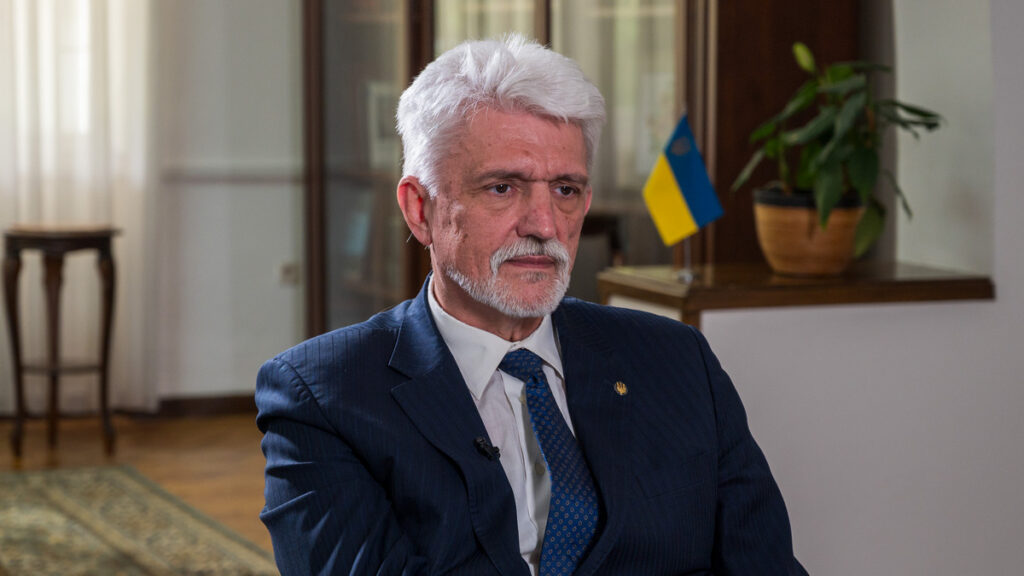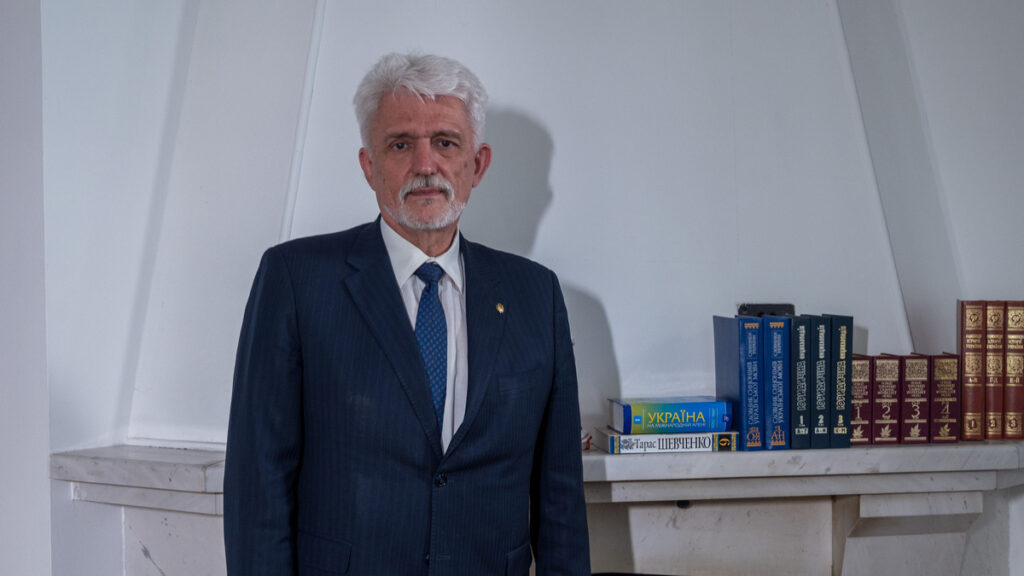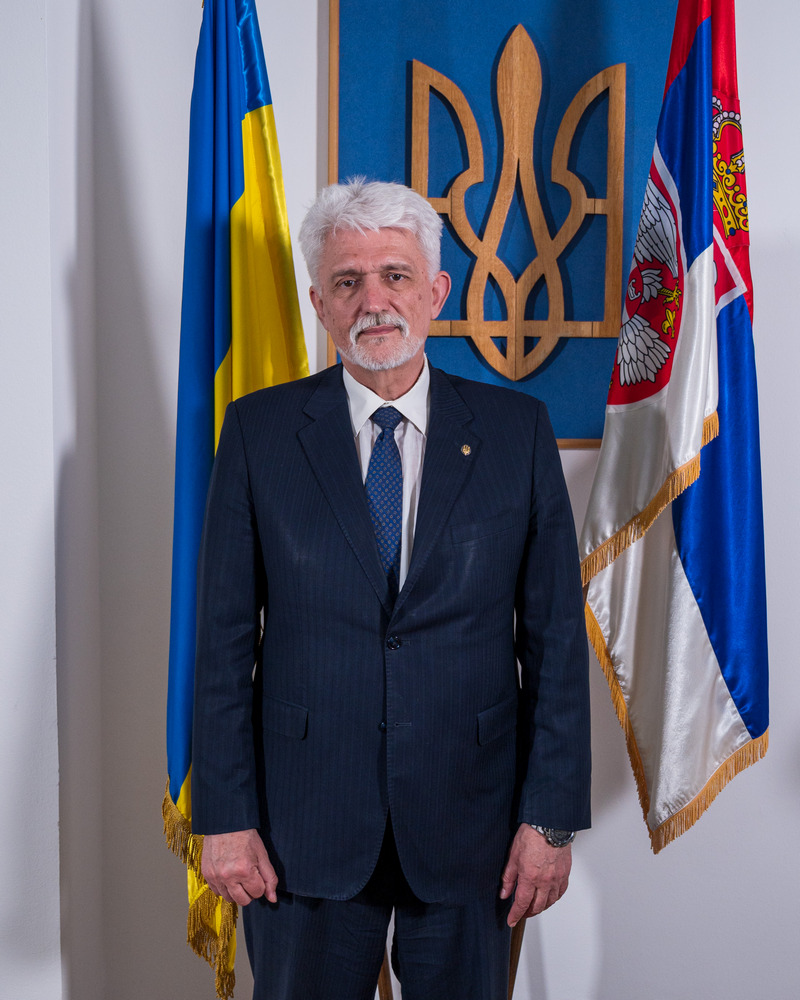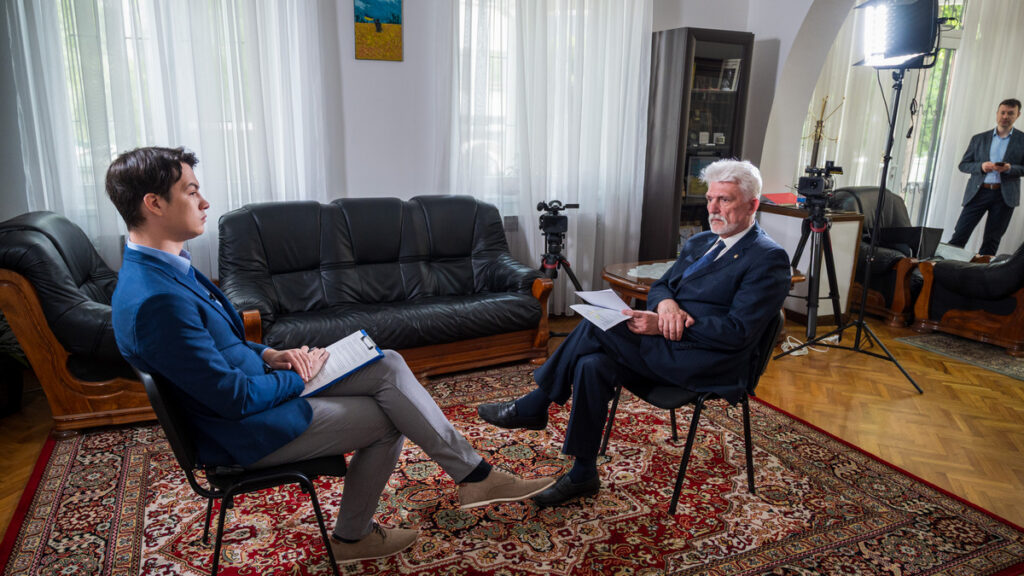From deep-rooted historical ties to today’s joint aspirations for peace, prosperity and EU integration – a Ukrainian perspective on diplomacy, resilience, and the bonds with Serbia

In an exclusive interview for the “Diplomata” TV show, produced by Diplomacy&Commerce magazine in cooperation with Euronews Serbia, H.E. Volodymyr Tolkach, Ambassador of Ukraine to Serbia, spoke with our colleague Mijat Kontić about the shared history of Ukraine and Serbia, the challenges of war, Ukraine’s European aspirations, and the role of diplomacy in turbulent times.
One topic I would like to begin this interview with is your diplomatic career. You have served in various diplomatic postings, including North Macedonia, Iraq, Kuwait, and now Serbia. How have the diverse political environments in these countries influenced your approach to diplomacy?
If we are starting with my diplomatic experience, I must say that I began my career with the OSCE mission in Georgia. I started as a peacekeeper in Georgia and Nagorno-Karabakh. In that sense, you could say that my entire life has been connected, directly or indirectly, to some form of conflict.
This diplomatic experience provided me with the opportunity to witness firsthand how people live and how peace can be preserved in the world. In my case, there was North Macedonia from 2001 to 2004 – the time of the first Ohrid Agreements – followed by a posting in Iraq.
Based on all of that, I came to understand that the fundamental task of every diplomat is to maintain peace and never to impose anything. When we try to impose solutions on other countries, we violate one of the basic principles of international life – political independence.
Therefore, the priority should always be to foster connection and cooperation between nations, and to avoid giving anyone a reason for crisis or conflict. That has been the foundation I have tried to build throughout my life – in every position I’ve held, including here in Serbia.
Of course, it is natural that we have different perspectives on how to build our countries and shape international relations. But above all, we must strive for dialogue and shared interests.

A historical fact that many of our readers may not know is that Serbian settlers lived in the 18th century in two provinces of what is now Ukraine, known at the time as New Serbia and Slavo-Serbia. How does this historical connection between our peoples influence contemporary relations between Serbia and Ukraine?
You see, it was only when I began to realise how much closer we are to one another than we might think that I truly started to understand our shared history. It’s not just about the two regions where Serbs once lived – it’s also about how similar the mentalities of our peoples are.
In that context, take the Serbian word graničar (border guard) – it closely resembles the Ukrainian Cossack. We both lived on the frontiers of the Ottoman Empire, and in both cases, we had to defend our lands. Your border guards and our Cossacks always stood firm. Our mentality and values are very much alike.
There are some truly fascinating stories. When Serbs lived in Ukraine in the 18th century, the area was called Slavo-Serbia. Sadly, it has now been completely destroyed by Russia. The administrative centre of Slavo-Serbia was Bakhmut. Another settlement, Myrhorod, was located near what is today Novosibirsk, also in Ukraine.
As I said, our mentality, our culture, and even our climates are quite similar. This gives us a unique opportunity.
Of course, history also has its darker chapters. For example, General Tekelija, an ethnic Serb, was responsible for destroying the Zaporozhian Sich, the stronghold of the Ukrainian Cossacks. On a more positive note, the last settlement of Ukrainian Cossacks – the so-called Banat Sich – was located in the area of Banat, here in Serbia, where Serbs also settled.
So, yes, we are truly close. Sometimes we talk about empires rather than people or places. Today, Russia tries to manipulate these terms – “the Russian Empire”, “we are brothers”, “Russia, Russia”, and so on. But we must re-examine this historical narrative. We must define our roles in history – yours and ours – and the ties that bind us.
We actually tried to organise a conference on this topic last year. Perhaps we’ll manage to hold it this year, if the opportunity arises. But I do want to stress that our histories are deeply intertwined, and that the bonds between us are strong.
That covers history, but I’d also like to talk about the present. Ukraine is on the path to EU membership, just as Serbia is still negotiating its accession. Do the two countries – Serbia and Ukraine – share any common experiences in this process, and how might these shared experiences encourage greater cooperation between us?
This is one of the key questions and shared interests for the future. In this regard, our strategic goal of joining the EU offers a valuable opportunity for close cooperation.
Just yesterday, I met with your Minister for European Integration, Mr. Starović, and we discussed the next steps on that path – including the potential signing of a memorandum of cooperation. Serbia already has considerable experience in EU negotiations. We do not – but our entire recent history has been shaped by our struggle along this path.
The desire of the Ukrainian people to be part of Europe is incredibly strong. In this context, I believe that combining your experience with our determination will give fresh momentum not only to Ukraine, but also to Serbia. And not just Serbia – to Ukraine as well. This is truly fertile ground for future cooperation between our countries.
Could you tell us how the war in Ukraine has affected the urgency of EU membership and deeper integration with European institutions?
Let me try to reframe the question slightly. This entire war began because Ukraine – first and foremost, our youth and students – tried to return to the European path. It was later labelled the “Maidan,” or a “colour revolution,” but in fact, it was something else entirely.
Everything started when our students initiated the process, after then-President Yanukovych turned away from the EU and pivoted toward Russia. In doing so, he broke every promise he had made when elected. When Russia – or rather the Kremlin clique, or junta, however one may call it – realised that Ukraine would not abandon its European path, they started this war.
It began with the aggression and annexation of Crimea, followed by the war in eastern Donbas. We tried to resolve the situation through negotiations, but unfortunately, in 2022, Russia launched a full-scale invasion of Ukraine.
However, over these past ten years–or more-the desire for European integration among the Ukrainian people has only grown stronger. In any case, we are determined to complete this journey. Sadly, it is very difficult to do so under the conditions of Russian aggression and occupation, but we are working diligently.
And I believe this will ultimately serve as a powerful example – both for us and for our friends who are also EU candidates and are pursuing the same path.

One of the things Serbia has become known for recently is its attempt to maintain neutrality in global conflicts. This was most evident in the recent case of Serbia changing its vote in the United Nations General Assembly – from “in favour” to “abstain” – regarding the resolution on Ukraine and the defence of its territorial integrity. How do you view the Serbian government’s position on the war in Ukraine?
We highly appreciate Serbia’s efforts in the humanitarian sphere. That is something we understand and acknowledge.
At the same time, Serbia has its own foreign policy and is trying to strike a certain balance between the sides – I mean between Russia and China on one hand, and the Western countries on the other. I understand how difficult that is to achieve. However, I would like to point out that we need to be clearer in international organisations, because, above all, every vote in such bodies provides an opportunity either for the aggressor or for us to convey certain information and perspectives to other countries.
For instance, Russia has used chemical weapons in Ukraine over 4,000 times. Yet at the same time, it is seeking to rejoin the Executive Council of the Organisation for the Prohibition of Chemical Weapons. It is the same situation in other countries and international bodies. We want to isolate Russia and prevent it, as the aggressor, from having any say in these organisations. Even if they are members, they must not be allowed to influence their work.
In this context, we kindly ask Serbia, in particular, to support us. We believe this is a very clear example: those who violate the rules and use chemical weapons cannot be in charge of such organisations. The same applies to the United Nations and other bodies – for example, the Council of Europe, which expelled Russia precisely because it violated the organisation’s principles on humanitarian matters and the rule of law.
We would like to see similar steps taken in other cases as well. That is why we would greatly appreciate it if Serbia reconsidered its position.
In the past, you have commented on the strong presence of Russian influence in Serbian media. How do you counter disinformation about the war in Ukraine that appears in Serbian public discourse?

What I can say is that this is a historical issue. I don’t wish to offer sweeping observations or debate why Russia features so prominently in your mass media. But today, that is the reality.
It is extremely important for all of us to understand where the freedom of mass media begins and ends – and where propaganda starts. For instance, in Ukraine, we also suffered losses in this regard. By respecting human rights principles, we gave freedom to Russian mass media, especially in the eastern and southern regions. But Russia used that opportunity – it exploited shared human rights standards to push propaganda.
I believe we must do much more to counter propaganda. We need to give the citizens of Serbia, just like the citizens of Ukraine, the opportunity to choose what they want to watch and how they want to act. Honestly, though, this can only be achieved in peaceful circumstances.
Once peace is restored in Ukraine, we will be able to do that. The same goes for Serbia – if you give people the opportunity, and I thank you for giving me the opportunity to express my views on all of this, I think things would be better, because the people of Serbia want to hear all perspectives and viewpoints on these matters.
One topic that has become a major global issue is the approach of the newly appointed Trump administration and its stance on Ukraine and the war. Just a few days ago, the United States signed an agreement with Kyiv on sharing part of the profits from the sale of Ukrainian minerals, as an incentive for Americans to invest in Ukraine’s defence. How do you view this approach by the US administration? Does it suggest a shift in policy – or is it something that was to be expected?
All of us – all our governments, particularly in democratic countries – primarily seek to secure benefits for our societies and citizens. I don’t wish to say anything negative about the approach of the new Trump team in the White House. But for us, in the context of Russian aggression against Ukraine, this is a highly sensitive issue, because every shift in position and every change in foreign policy – especially by the United States – comes at the cost of blood and lives of our soldiers.
As for this resource agreement, you mentioned – we are living in a new era, a time when globalisation has reached an immense level. Today, when we speak of any country, all countries are, in some way, involved in the process of deciding how to live and how to participate in joint production in this world.
Sometimes I wonder – in the case of Mariupol, for example, had Azovstal, our vast steelworks, been under joint ownership with the US, Germany or China, would Russia still have launched this aggression? I know there are similar examples with some of our plants in Dnipro, Zaporizhzhia and other cities.
That’s why I believe we must demand stronger commitments from our partners – but we also need to integrate our industry and our resources into the global system. In this case, I haven’t seen all the details of this resource-sharing memorandum, but I believe it also protects the interests of my people.
Ukraine has continued to strengthen its economic ties with the EU despite the ongoing war. How do you see the potential for trade cooperation between Serbia and Ukraine – if not today, then in the future – particularly in areas such as investment, energy and technology?
We absolutely need to take concrete steps in this regard. First and foremost, we must establish a favourable framework for our trade exchange. It’s no secret that Ukraine and Serbia have been competitors in the agricultural sector. That’s why we need to negotiate and create a regime that allows both our exporters and Serbian exporters to benefit from a liberalised trade system.
We should establish a free trade zone and sign a free trade agreement – one that includes a smart approach to agriculture and other sectors. When it comes to technology, Ukraine has a great deal to offer Serbia – and Serbia likewise has valuable expertise to offer Ukraine. This is one area where we must act without delay, rather than postponing any further.
The same applies to the energy sector. Unfortunately, many of our major factories that produce turbines and other energy-related equipment are currently under bombardment in Kharkiv and other cities. Still, we now have an opportunity to export not just products, but the technology behind them, to other countries. And we must seize that opportunity.
We organised a business forum last year, but we need to hold such events more frequently. At this point, we are trying to accelerate our bilateral relations and encourage the chambers of commerce to be more proactive.
In 2023, former Serbian Prime Minister Ana Brnabić stated that more than 40,000 Ukrainian refugees were residing in Serbia. What is the Ukrainian Embassy doing to support their integration, and what mechanisms have been put in place to help them adapt to Serbian society?
This is a very sensitive issue for us, because – and I must reiterate this – we will always remember your support for our people. I recall my first visit with your President, Mr Aleksandar Vučić, to Vranje, where some of our refugees were accommodated. We are deeply grateful for that, as the conditions at the centre in Vranje are excellent – among the best in the region – and your country enabled our citizens to live there with dignity.
However, we also need to provide something more – the opportunity for employment. Only the elderly or mothers with young children can manage without work; the rest of the people must have a chance to earn a living. In that sense, we especially appreciate what IKEA has done – they opened up opportunities for our citizens to apply for jobs and work at their facilities near Belgrade. Some of our nationals have also settled in Vojvodina and found employment there.
That said, this continues to be a challenge for us. As you mentioned, Ana Brnabić cited the figure of 43,000 refugees – but today, only around 1,500 remain in Serbia.
Have you encountered any personal stories from Ukrainian refugees in Serbia that particularly moved you?
I could show you a few photographs after this interview. I was truly shocked by the story of one family from Kharkiv. They arrived at the centre in Vranje by car – not some specially equipped vehicle, just an ordinary Daewoo. That car was riddled with Russian bullets. It had no windows, and there were holes all over from gunfire. What struck me most was that these so-called Russian soldiers had even aimed at the fuel tank.
It was a family – two women, a mother and daughter, with a young girl. They stayed in Vranje for almost a year, and have since relocated to Canada. But I was deeply affected by the thought of how two women and a child managed to make that perilous journey in a bullet-riddled car.
I also met other Ukrainian nationals who have been living in Vranje for over a year. They keep asking me, “How can we work? Where can we find jobs?” They cannot just sit there with no employment or prospects. Some of them have now moved to Novi Sad, where they started a small business producing clothing and selling it in Belgrade.
To me, that is a positive sign – they have not given up; they are trying to live. But it is also very important for us to bring them back to Ukraine. After the war, we will have a monumental task of rebuilding. Many of our cities have been completely destroyed. As I mentioned earlier, Bakhmut no longer exists, and Mariupol, along with many others, has been partially or totally levelled.
That is why we will need a strong workforce. And in that sense, I take this opportunity to call on your companies – especially those in construction – to take part in the future reconstruction of Ukraine.
What message would you like the Serbian people to take away from Ukraine’s fight for survival?
First and foremost, never rely on just one source of information. When people say this is a battle between East and West, understand that it is not. This is not a conflict between East and West – we are simply trying to defend our country. Everything else is propaganda.
Secondly, don’t listen to or attempt to defend principles that are not clearly defined. For example, I see no difference between fascism, the so-called Aryan nation, and what is now being called the “Russian World.” The Aryan nation was Hitler’s creation – he gave one nation greater rights over others. Similarly, today, some Russian ideologists are trying to give more rights to Russians and claim they are building a “Russian World.” But that is no world of peace – it’s something else entirely.
If even a single child dies in that struggle, it means that the whole ideology is worthless. Zero. So – be cautious. Above all, we must fight for our families and for the lives of all people in this world.